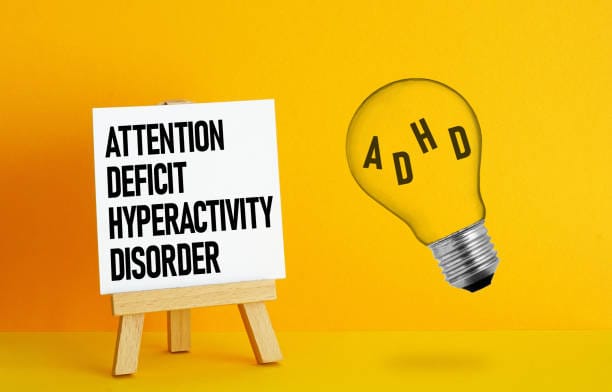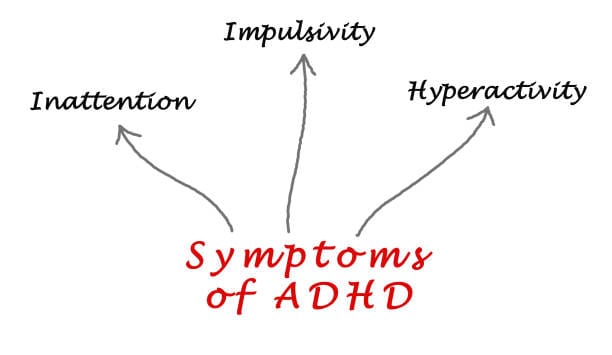For decades, the relationship between nutrition and the brain has been under-appreciated. But recently the link between the two has gained considerable interest. It is now clear that dietary interventions can have a significant impact on a number mental health issues (like anxiety and depression) as well as neuro-developmental conditions and neurodiversity like autism or ADHD - Attention Deficit Disorders (with or without hyper-activity).
Over the past 15 years, enormous progress has been made in the field of psycho-nutrition. “Psycho-nutrition” is the science exploring how your food influences someone's mental health, cognition, and emotional balance.

The case of ADHD (Attention Deficit Hyperactivity Disorder)
Just as in other neuro-developmental conditions, the factors that predispose someone to ADHD (Attention Deficit Hyperactivity Disorder) are both genetic and environmental. And one of the most powerful environmental influences on brain function, is what we eat.

For people with attention deficit (with or without hyperactivity), particular consideration should be devoted on glyceamia and nutritional balance. Even when medication is prescribed, optimising micronutrient intake can support better outcomes.
Like any engine, and like all the organs in your body, your brain functions best when it gets premium fuel. Eating high-quality foods that contain lots of vitamins, minerals, and antioxidants nourishes the brain. It also protects it from oxidative stress and vulnerability. In addition, good nutrition will boost the synthesis of neuro-transmitters that regulate brain activity : particularly serotonin, dopamine, glutamate and acetylcholine. They each play a key role in memory, motivation, learning, mood, sleep, muscle relaxation.
A) Serotonin
Serotonin, often nicknamed “the happiness molecule,” does much more than regulate mood. It influences sleep, mood, anxiety, and impulsivity— key aspects of ADHD. It is synthesised from tryptophan, an amino acid found in foods like eggs, turkey, legumes, dark chocolate, pumpkin seeds, and bananas.
Remarkably, about 90% of serotonin is produced in the gut, linking the microbiome directly to brain function. An imbalanced diet can therefore impact serotonin production by disturbing gut health. Probiotics will have a significant positive impact there.

B) Sugar, Dopamine, and the Energy Rollercoaster
Dopamine is a neuro-transmitter that is essential for motivation and motor control. It is released by high-fat and high-sugar foods. Unfortunately these can lead to cravings and overeating.
People with ADHD are particularly sensitive to energy fluctuations caused by impulsive eating patterns, often high in refined sugars. These spikes and crashes in blood sugar affect mental energy, mood stability, and focus. Without a steady supply of glucose from complex carbohydrates, the brain switches into “survival mode,” leading to irritability, fatigue, and decreased attention—symptoms often mistaken for behavioural problems rather than physiological imbalances.
Highly processed, sugary, or fatty foods provide short-term relief by triggering dopamine release—the brain’s reward signal—but this is followed by a cognitive and emotional crash. Over time, this cycle reinforces poor eating habits and worsens attention and emotional regulation.
Foods that support healthy dopamine levels include : thyrosine-rich food (found in poultry, fish, eggs, cheese, nuts, seeds and soy products), vitamins B, D, zinc, iron, probiotics and good fats (found in oily fish, avocados, nuts)
Nutrition Does Not Cure ADHD—But It Can Help
No diet, no matter how “natural” or “anti-inflammatory,” can cure ADHD. It is a complex neuro-developmental disorder rooted in genetic, structural, and neuro-chemical factors. However, while nutrition doesn’t cause or cure ADHD, it can support brain health and sometimes ease daily challenges. For certain individuals, targeted nutritional strategies can help modulate symptoms and complement other treatments.

Modern Diets and Brain Vulnerability
Today, one-third of the foods we consume are ultra-processed—laden with saturated fats, refined sugars, additives, and stripped of nutrients. These products also disrupt the gut microbiome, which in turn weakens immunity and mental resilience. A poorly nourished brain becomes more vulnerable to stress, anxiety, and mood swings, just as the body becomes sensitive to cold without proper protection.
Biological stress can also be triggered by psychological stress—for example, bullying or workplace harassment or learning difficulties. It will activate inflammatory responses in the body. This is where psycho-nutrition offers an integrative view, showing how mental stress, inflammation, and nutrition are interconnected.

Nutrition is not a magic fix—but it’s a powerful lever for well-being.



